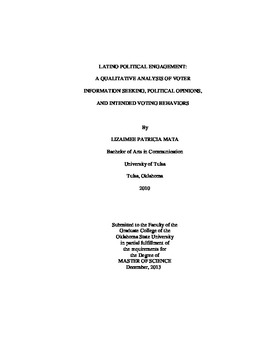| dc.contributor.advisor | McGuire, John | |
| dc.contributor.author | Mata, Lizaimee Patricia | |
| dc.date.accessioned | 2015-06-17T20:06:52Z | |
| dc.date.available | 2015-06-17T20:06:52Z | |
| dc.date.issued | 2013-12-01 | |
| dc.identifier.uri | https://hdl.handle.net/11244/14987 | |
| dc.description.abstract | This study analyzes how media coverage and interpersonal communication affect U.S. born Latinos and Latino immigrants in their evaluation of political issues and candidates. It employs the agenda-function of the media and the two-step flow of communication theory as primary evaluation frameworks. The researcher conducted in- depth interviews with U.S. born Latinos and Latino immigrants who have voted in at least one election to establish themes in terms of media consumption, language of media coverage and interpersonal communication. Respondents were divided into two tiers according to their level of political activity: more politically active and less politically active. Such aspects were analyzed in order to establish their influence on the respondents' perceptions about political issues and candidates, especially during a political campaign. The researcher found that the Internet and social media served as primary sources of information for respondents. More politically active respondents were likely to seek out information from various media sources online about political issues and candidates. These respondents were also likely to share information found online with friends and family members on social media. Less politically active respondents were likely to rely on the information posted by friends and family members on social media to learn about political issues and candidates. They only actively searched for information related to specific issues that they considered salient, such as immigration or immigration reform. Such findings suggested that the two-step flow of communication theory prominently applied to how study respondents learned about political issues and candidates. Agenda setting's influence on respondents was limited to more politically active respondents conducted their online searches for political information. | |
| dc.format | application/pdf | |
| dc.language | en_US | |
| dc.publisher | Oklahoma State University | |
| dc.rights | Copyright is held by the author who has granted the Oklahoma State University Library the non-exclusive right to share this material in its institutional repository. Contact Digital Library Services at lib-dls@okstate.edu or 405-744-9161 for the permission policy on the use, reproduction or distribution of this material. | |
| dc.title | Latino Political Engagement: a Qualitative Analysis of Voter Information Seeking, Political Opinions, and Intended Voting Behaviors | |
| dc.type | text | |
| dc.contributor.committeeMember | Mckinnon, Lori | |
| dc.contributor.committeeMember | Fullerton, Jami | |
| osu.filename | Mata_okstate_0664M_13134.pdf | |
| osu.accesstype | Open Access | |
| dc.description.department | Mass Communications | |
| dc.type.genre | Thesis | |
| dc.subject.keywords | agenda setting | |
| dc.subject.keywords | interpersonal communication | |
| dc.subject.keywords | latinos | |
| dc.subject.keywords | media | |
| dc.subject.keywords | two-step flow of communication | |
| dc.subject.keywords | voting | |
